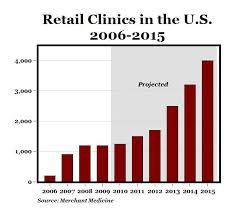 A recent study from the Center for Studying Health System Change reported that 1% of U.S. families reported using a retail health clinic in the previous year in 2007 and by 2010 that usage had increased to 3%. The Robert Wood Johnson Foundation reported that retail clinics are “projected to account for about 10 percent of outpatient primary care visits by 2015.” A recent estimate claims that more than 1,400 health clinics now operate inside retail chain stores.
A recent study from the Center for Studying Health System Change reported that 1% of U.S. families reported using a retail health clinic in the previous year in 2007 and by 2010 that usage had increased to 3%. The Robert Wood Johnson Foundation reported that retail clinics are “projected to account for about 10 percent of outpatient primary care visits by 2015.” A recent estimate claims that more than 1,400 health clinics now operate inside retail chain stores.
Does the increased presence and use of retail clinics matter? It should.
Retail clinics rely heavily on nurse practitioners who operate without an on-premises physician. These nurse practitioners are less expensive than doctors with respect to salaries. Consequently, retail clinics can provide basic care at lower costs than would be the case at a typical primary care physician. For example, Walgreens healthcare clinic advertises prices of $79 to $89 for patient exams pertaining to illness, pain, injury & skin exams. In comparison, FairHealthConsumer.org estimates that an established patient office or other outpatient visit (typically 10 minutes) paid out-of-pocket would cost $138 in a Boston suburb. Surprisingly, the price difference between retail clinics and physician practices has not resulted in faster adoption of these facilities by the public.
However, there are objections to retail clinics in some quarters. Dr. Sam Unterricht, president of the Medical Society of the State of New York, has stated “The society, and physicians in general, think retail clinics are a threat to the quality of care and a threat to physicians financially.” Part of the concern is the potential conflict of interests with respect to prescribing drugs dispensed at the pharmacy hosting the retail clinic or recommending other medical supplies sold at the pharmacy. However, conflicts of interest also exist for doctors who could direct patients to doctors and medical services offered by the physician’s practice. It would seem to me that the quality of clinical outcomes is more important in this discussion, though not to the exclusion of exploring potential conflicts of interests.
The clinics themselves are expanding the services they offer, from routine vaccinations to the treatment and management of chronic conditions such as asthma, diabetes, and hypertension. I have not seen any negative press regarding the quality of vaccination work, blood pressure checks, and other basic care provided at retail clinics. If that trend is maintained for expanded medical services such as the management of chronic conditions, retail clinics could be one small step toward curbing healthcare costs in the U.S
By Kev Coleman www.healthpocket.com

